Alexander Laurence's Blog, page 2455
June 2, 2014
schonwald - "sacred hearts"
schonwald - "sacred hearts"
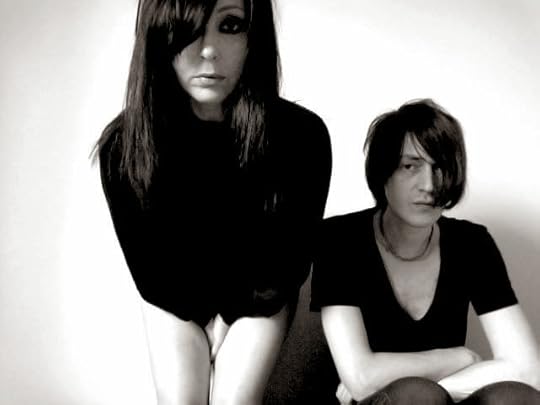
Schonwald is a duo from Italy
Schonwald is all about atmospheres: hypnotic minimalist mood and a noise inclination with echoes of Suicide, New Order, The Cure, mingling with synth melodies straight from the '80. Their first album "Amplified nature" was realized in February 2009 on a special Vinyl edition including CD on Pocket Heaven Records (Lux).Schonwald live debut was in London at "Myogenic Festival" and Ampliefied Nature has been supported by 4 European tours through Italy, England, France, Swizerland , Luxembourg, Germany.
"Mercurial" is the last single out into a vinyl 7" in spring 2013 via Chicago label HoZac Records.
https://www.facebook.com/schonwald.musichttps://soundcloud.com/schonwalderhttps://twitter.com/#!/weareschonwaldhttp://schonwald.bandcamp.com
Published on June 02, 2014 10:27
PAWS >> second album 'Youth Culture Forever' out today
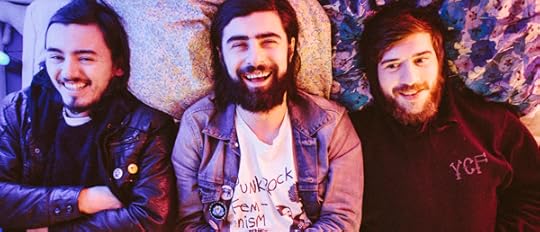 PAWSYouth Culture Forever album out today via FatCat Records PAWS’ second album,
Youth Culture Forever
, comes out today on Fat Cat Records. This album saw the band decamp to a studio in the woods just outside New York to hone and expand on the sound that saw their debut
Cokefloat!
acclaimed by the likes of Pitchfork, BBC music, and nominated for the Scottish Album of the Year Awards.
PAWSYouth Culture Forever album out today via FatCat Records PAWS’ second album,
Youth Culture Forever
, comes out today on Fat Cat Records. This album saw the band decamp to a studio in the woods just outside New York to hone and expand on the sound that saw their debut
Cokefloat!
acclaimed by the likes of Pitchfork, BBC music, and nominated for the Scottish Album of the Year Awards."The Glasgow trio bring an almighty ruckus on their second album, building on the ear-splitting success of 2012 debut Cokefloat" - NME
"A bolder, more dynamic beast than its predecessor" - SPIN
"...shakes and sears like an active volcano" - Pitchfork (7.2/10)
"A subtler, more thoughtful take on... the contradictory themes of enthusiasm and bitterness" - Allmusic.com (4/5)
"Their glorious noise this time veers between those trademark bursts of heart-on-sleeve melody and something more dark and brooding" - Loud and Quiet
Stream Youth Culture Forever (private link, please don't share):
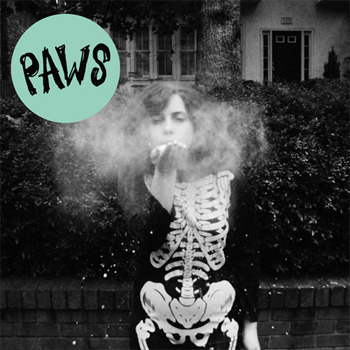
PAWS are also playing a string of UK tour dates:
02.06 Cambridge - Portland Arms
03.06 Birmingham - Sunflower Lounge
04.06 London - The Waiting Room
05.06 Manchester - Castle Hotel (free entry)
06.06 Glasgow - The Art School
07.06 Edinburgh - Wee Red Bar
20.06 London - Camden Crawl @ Underworld (Drowned in Sound)
21.06 London - Camden Crawl @ The Lock Tavern (Sexbeat)
27.07 Deer Shed Festival, North Yorkshire
Tickets available here
LINKS:
www.wehavepaws.com
www.facebook.com/wehavepaws
www.twitter.com/wehavepaws
www.fat-cat.co.uk
Published on June 02, 2014 10:26
SINÉAD O'CONNOR - BRAND NEW ALBUM
SINÉAD O’CONNOR
BRAND NEW ALBUM
‘I’M NOT BOSSY, I’M THE BOSS’
RELEASED AUGUST 11TH 2014

Acclaimed Irish singer-songwriter Sinéad O’Connor releases her brand new studio album ‘I’m Not Bossy, I’m The Boss’ via Nettwerk Records on August 11th 2014. The first single from the album entitled ‘Take Me To Church’ is released on the same day.
‘I’m Not Bossy, I’m The Boss’ is the follow up to Sinead’s critically acclaimed album ‘How About I Be Me (And You Be You)?’ which was released in 2011.
‘I’m Not Bossy, I’m The Boss’ features twelve brand new songs which showcase the very best of Sinéad and what makes her so special, passionate and direct yet with an overarching fragile beauty Sinéad’s voice and lyrics are as powerful as they are tender.
Newly signed to Nettwerk Records, ‘I’m Not Bossy, I’m The Boss’ is her 10th studio album in a career spanning over twenty five years. Sinéad is a rare thing in popular music, an absolutely unique artist.
From her first breakthrough hit, 1987’s ‘Mandinka’ and the multi-platinum global success of 1990’s ‘I Do Not Want What I Haven’t Got’ and its unforgettable number one ‘Nothing Compares 2 U’, right through to her brand new record Sinead has constantly surprised and delighted.
Going from million selling artist to fearless genre-crossing forays into Irish folk and roots reggae and collaborations with artists as diverse as Peter Gabriel, Massive Attack and The Chieftains, Sinéad has trodden a unique path to become the most iconic Irish artist of the past thirty years.
BRAND NEW ALBUM
‘I’M NOT BOSSY, I’M THE BOSS’
RELEASED AUGUST 11TH 2014

Acclaimed Irish singer-songwriter Sinéad O’Connor releases her brand new studio album ‘I’m Not Bossy, I’m The Boss’ via Nettwerk Records on August 11th 2014. The first single from the album entitled ‘Take Me To Church’ is released on the same day.
‘I’m Not Bossy, I’m The Boss’ is the follow up to Sinead’s critically acclaimed album ‘How About I Be Me (And You Be You)?’ which was released in 2011.
‘I’m Not Bossy, I’m The Boss’ features twelve brand new songs which showcase the very best of Sinéad and what makes her so special, passionate and direct yet with an overarching fragile beauty Sinéad’s voice and lyrics are as powerful as they are tender.
Newly signed to Nettwerk Records, ‘I’m Not Bossy, I’m The Boss’ is her 10th studio album in a career spanning over twenty five years. Sinéad is a rare thing in popular music, an absolutely unique artist.
From her first breakthrough hit, 1987’s ‘Mandinka’ and the multi-platinum global success of 1990’s ‘I Do Not Want What I Haven’t Got’ and its unforgettable number one ‘Nothing Compares 2 U’, right through to her brand new record Sinead has constantly surprised and delighted.
Going from million selling artist to fearless genre-crossing forays into Irish folk and roots reggae and collaborations with artists as diverse as Peter Gabriel, Massive Attack and The Chieftains, Sinéad has trodden a unique path to become the most iconic Irish artist of the past thirty years.
Published on June 02, 2014 10:22
Zig Zags shares new video + Interview with Pitchfork + LP due 6/16
ZIG ZAGS SHARES "SO STONED" VIDEO VIA NOISEY INTERVIEWS WITH PITCHFORK ZIG ZAGS DUE JUNE 16TH VIA IN THE RED RECORDS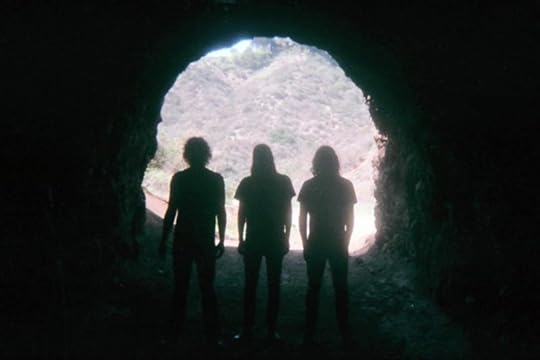
Credit: Denée PetracekWATCH: "So Stoned" - http://youtu.be/qbhcGFwhkns
Los Angeles power trio Zig Zags will be releasing their self-titled debut LP on June 16th via In The Red Records. The album was recorded at Ty Segall's Sweat Lodge studio and Segall help produce it. Today, the band shared their music video for "So Stoned" via Noisey alongside an interview. Additionally, head over to Pitchfork for a guest list interview with the group.
Tour Dates: 6/14 - San Diego, CA @ Soda Bar !6/27 - Los Angeles, CA @ Echoplex *9/18 - Amsterdam, NL - Paradiso Kleine Zaal10/22 - Ramonville St Agne, FR @ Le Bikini $ ! w/ Endless Bummer* w/ Bleached, Audacity, and L.A. Witch$ w/ Ty Segall

Credit: Denée PetracekWATCH: "So Stoned" - http://youtu.be/qbhcGFwhkns
Los Angeles power trio Zig Zags will be releasing their self-titled debut LP on June 16th via In The Red Records. The album was recorded at Ty Segall's Sweat Lodge studio and Segall help produce it. Today, the band shared their music video for "So Stoned" via Noisey alongside an interview. Additionally, head over to Pitchfork for a guest list interview with the group.
Tour Dates: 6/14 - San Diego, CA @ Soda Bar !6/27 - Los Angeles, CA @ Echoplex *9/18 - Amsterdam, NL - Paradiso Kleine Zaal10/22 - Ramonville St Agne, FR @ Le Bikini $ ! w/ Endless Bummer* w/ Bleached, Audacity, and L.A. Witch$ w/ Ty Segall
Published on June 02, 2014 10:20
JAMES BLACKSHAW - FANTOMAS : LE FAUX MAGISTRAT
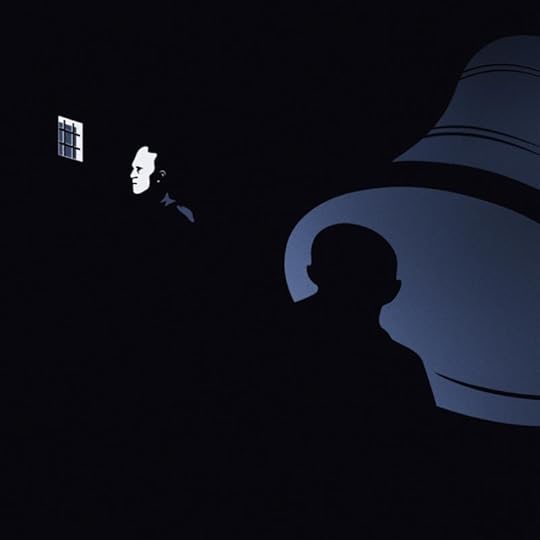
JAMES BLACKSHAW RELEASES 'FANTôMAS : LE FAUX MAGISTRAT' ON TOMPKINS SQUARE, JULY 8th Live album features Simon Scott (Slowdive), Duane Pitre
In celebration of the centenary of Louis Feuillade's Fantômas silent film series, James Blackshaw was invited by Yann Tiersen to perform a live score to the fifth and final film, Le Faux Magistrat, at the beautiful and prestigious surroundings of the Théâtre de Châtelet, Paris on October 31st 2013.
Fantômas - a master of disguise and symbol of terror - is one of the most popular characters in French crime fiction, as well as a favourite with the avant-garde, particularly the surrealists.
Tim Hecker, Amiina, Yann Tiersen and Loney Dear also performed during the event (which was broadcast live on the European ARTE channel) each bringing their own unique sonic perspective to the other installments in the series.
Written during the course of a few months, Blackshaw drew influences from French impressionist composers, Brazillian guitar music, musique concrete and the works of other film composer such as David Shire and Pino Donaggio, to create a noirish score that is in turns sinister, quietly profound and thrilling.
Personally invited by James Blackshaw, experimental musicians Duane Pitre and Simon Scott (also of Slowdive) contributed drums, electronics, synth, bowed guitar, bass and more to Blackshaw's nylon string guitar and grand piano, with multi-instrumentalist Charlotte Glasson adding violin, vibraphone and several wind instruments to the 75 minute long work.
Published on June 02, 2014 10:19
Farmfest 2014!
FARMFEST 2014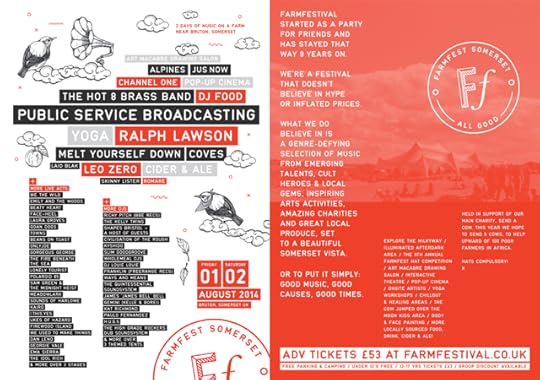
Announce DJ Food 'Children of the Sun' Mix + Launch Brand New Website & Video premiereListen Here http://bit.ly/1lYlOH0New website: www.farmfestival.co.ukVideo link: http://vimeo.com/95337605Ahead of his headline appearance at Farmfestival this August DJ Food has put together a laidback blend infused with the spirit of summer.'Children of the Sun' is a mix about the sun and summer in general, made especially for Farmfestival 2014. 50 minutes designed to relax to outside, lying on the grass in the warmth of the sun. Taking in jazz, beats, ambient, soul, funk, rock and electronica each track comments on the sun, summer or the great outdoors in some way – DJ FoodThe in-house team at Farmfest have been busy creating a brand new website for the festival which is live now. Accompanying the new site is a video previewing this year’s event and celebrating Farmfestival over the years.Farmfestival 2014Date: Friday 1st – Saturday 2nd August 2014Location: Gilcombe Farm, Bruton, SomersetPrice: Adult weekend advance £53, 12-17 weekend £42.50, Campervan pass £25Tickets: https://tickets.partyforthepeople.org.uk/events/205-farmfestival-2014Website: http://farmfestival.co.uk/Facebook: http://www.facebook.com/FarmfestivalTwitter: https://twitter.com/#!/Farmfestival ;Full Line-upBands: Public Service Broadcasting, The Hot 8 Brass Band, Melt Yourself Down, Coves, Alpines, Beaty Heart, We The Wild, Emily and The Woods, Laura Groves, Face+Heel, Jus Now, Laid Blak, onlyjoe,Skinny Lister, Beans on Toast, The Fire Beneath The Sea, Gorgeous George, Polaroid 85, We Used To Make Things, Sounds of Harlowe, Goan Dogs, Towns, Meadowlark, Sam Green and The Midnight Heist,Lonely Tourist, Gemini (Kelle & Borei), The Ukes of Hazard, Firewoodisland, Kairo, Ema Sierra, Georgie Vale, Rhys ColemanDJs: Ralph Lawson, DJ Food, Channel One Sound System, Romare, Leo Zero, Richy Pitch (BBE Records), The Kelly Twins, Kyshido, Shapes DJs + special guests, Wholemeal DJs + special guests,Slim Goodgroove, DJ Louie Louie, Franklin, H.U.G.S., Ways And Means, The Quintessential Soundsystem, Paulo Fernandez, James ‘James Bell’ Bell, Kat Richmond, Farmfestival Djs

Announce DJ Food 'Children of the Sun' Mix + Launch Brand New Website & Video premiereListen Here http://bit.ly/1lYlOH0New website: www.farmfestival.co.ukVideo link: http://vimeo.com/95337605Ahead of his headline appearance at Farmfestival this August DJ Food has put together a laidback blend infused with the spirit of summer.'Children of the Sun' is a mix about the sun and summer in general, made especially for Farmfestival 2014. 50 minutes designed to relax to outside, lying on the grass in the warmth of the sun. Taking in jazz, beats, ambient, soul, funk, rock and electronica each track comments on the sun, summer or the great outdoors in some way – DJ FoodThe in-house team at Farmfest have been busy creating a brand new website for the festival which is live now. Accompanying the new site is a video previewing this year’s event and celebrating Farmfestival over the years.Farmfestival 2014Date: Friday 1st – Saturday 2nd August 2014Location: Gilcombe Farm, Bruton, SomersetPrice: Adult weekend advance £53, 12-17 weekend £42.50, Campervan pass £25Tickets: https://tickets.partyforthepeople.org.uk/events/205-farmfestival-2014Website: http://farmfestival.co.uk/Facebook: http://www.facebook.com/FarmfestivalTwitter: https://twitter.com/#!/Farmfestival ;Full Line-upBands: Public Service Broadcasting, The Hot 8 Brass Band, Melt Yourself Down, Coves, Alpines, Beaty Heart, We The Wild, Emily and The Woods, Laura Groves, Face+Heel, Jus Now, Laid Blak, onlyjoe,Skinny Lister, Beans on Toast, The Fire Beneath The Sea, Gorgeous George, Polaroid 85, We Used To Make Things, Sounds of Harlowe, Goan Dogs, Towns, Meadowlark, Sam Green and The Midnight Heist,Lonely Tourist, Gemini (Kelle & Borei), The Ukes of Hazard, Firewoodisland, Kairo, Ema Sierra, Georgie Vale, Rhys ColemanDJs: Ralph Lawson, DJ Food, Channel One Sound System, Romare, Leo Zero, Richy Pitch (BBE Records), The Kelly Twins, Kyshido, Shapes DJs + special guests, Wholemeal DJs + special guests,Slim Goodgroove, DJ Louie Louie, Franklin, H.U.G.S., Ways And Means, The Quintessential Soundsystem, Paulo Fernandez, James ‘James Bell’ Bell, Kat Richmond, Farmfestival Djs
Published on June 02, 2014 10:17
June 1, 2014
SWANS live in NYC
Published on June 01, 2014 17:34
Rikki Ducornet Interview
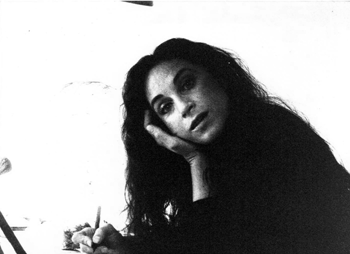
Rikki Ducornet Interview(author of Phosphor in Dreamland)by Alexander Laurence
For those of you who haven't read Rikki Ducornet's amazing fiction, this is as good place to start as any. Rikki Ducornet is truly one of the great writers of our time. Reminiscent of Angela Carter, but as unique. Her stories are surreal, imaginative, elegant, aggressive and subtle. It is fun entering these worlds and getting lost and returning back feeling transposed, violated. Rikki Ducornet has a satiric and literary quality that is always interesting and moving. She is also the author of a quartet of novels: The Stain, Entering Fire, The Fountains of Neptune, and The Jade Cabinet. She lives is Denver, Colorado.
Alexander Laurence: In Phosphor in Dreamland, I was very interested in the sculpture in the shape of a frog. It seems that is a good image for much of your work which often combines the natural world, pleasure.
Rikki Ducornet: I was thinking about Sheela-Na-gig. In archaic sacred spaces of Ireland, she was represented squatting in a coital position; sometimes she is given form as a frog: that seemingly perpetual fornicator.
AL: Where do you start off when writing a book? In a creative writing class the teacher would tell the student "Write about your experience." I don't get that sense from reading your work.
RD: Everything I write is informed by experience--experience not limited to the street, bathroom, and kitchen, but that includes dreams and reveries, ideas and conversations, an interest in philosophy, in gnostic heresies, in politics and so on. For example, Kafka's phrase: "All language is but a poor translation" had much to do with the writing of The Jade Cabinet.
AL: So you don't start out with a plan or an outline?
RD: No. I work organically: one idea engenders another. I work intuitively: the book is a landscape I am exploring for the first time without compass or map. Each book is its own unique process and each is a voyage of discovery. Dreams are signposts or luminous beacons along the way; I am far too interested in the process to straight-jacket it by a pre-conceived plan.
AL: How did the new book start out? I would think that Phosphor appeared suddenly...
RD: Phosphor in Dreamland started off as a different book. This was the first time I had an idea in mind, rather than a seminal dream or voice. I had a Cuban grandmother who was a mythomaniac; I intended to write about her phantasamagorcal Cuba. But in no time at all another island appeared--Birdland--and a city--Pope Publius--inhabited by a crazed wretch--Fogginius--who would not shut up. I started writing the book from my point of view as a child listening to grandmother's stories. When Phosphor appeared on Fogginius' stoop, the book took off.
AL: There was a footnote referring to Pulco, and the fact that he deserved a book of his own. Will that happen or is that too literal minded?
RD: It won't happen. Above all I wanted to suggest such a book. I like the idea of a potential book about Pulco because it implies that despite the Inquisition, Pulco will flourish.
AL: You started out as an artist. How did you decide that the art would take a back seat and the writing would begin?
RD: I didn't decide. The first novel, The Stain, seized me by the scruff of the neck, as did the ones to follow. But I continue to draw and one day I will get back to painting. This is something I have promised myself.
AL: How do you see yourself as fitting in with the Post-Modernism dialogue and Post-Modern writing? I say that since you were included in this Avant-Pop anthology which includes several writers, most having to do with this dialogue.
RD: The "fit" is an accident. If I "belong" with the Post Modern tribe perhaps it is because I am so taken up with the idea of fiction as an infinite process of mind and fascinated with the idea of mind as a process of fiction. Perhaps this is why I write about madmen so much. And as you know I perceive fiction as a species of magic: words engendering worlds.
AL: That reminds me of The Aleph?
RD: Borges' Aleph is, among other things, a wonderful metaphor for the mind of the writer. Like Borges, I am interested in Kabalistic texts, that metaphysical delirium which is an attempt to find the word, or, rather the letter potent enough to precipitate a cosmos. My characters are often seen thrashing about in metaphysical deliriums!
AL: I was also wondering how the Surrealist movement has informed your writing?
RD: The great surrealists: Breton, Eluard, Ernst, Toyen, Mansour, Tanguy--have all been a profound inspiration. They led me to Freud and to alchemy, to the aborigine paintings of dream time and to aesthetic experiments of all kinds including collage.
AL: Are you at all interested in pastiche, plagiarism, or appropriation?
RD: No. I am bored by pastiche and have no patience with plagiarism. Recently Max Ernst was called a plagiarist but in fact he created a new art form from preposterous, sentimental, and trashy newspaper images. He subverted them and made something interesting, evocative and strange which led to a new way of seeing. Yet the collages are only a part of his oeuvre which is startling and vast. They are like what the Kabbalists called "skipping and hopping" -- ways of disorganizing the mind to make room for startling and informing visions.
AL: Also Max Ernst never passed off other's works as his own. We all knew right away that he was taking magazine and newspapers and making these collages.
RD: That's right. The material he took was literally raw and transformed--one could say transformed--by the artist's imagination. Just as Harry Mathews may use disarticulated fictions or scientific works, whatever, as a species of fantastic alphabet with which to spell something entirely new. But back to plagiarism--doesn't it seem to you like a drab academic exercise? Not to say dishonest! It's too easy. Good art takes time....
AL: Yeah. It's like Post-Modern connect the dots.
RD: That's right. Like number painting.
AL: Do you think that a writer only needs to concern herself or himself with writing one good sentence after another, and that plot is secondary?
RD: Plot is not secondary but essential, the heart of the matter, the bright web that connects all the elements and causes them to throb and shudder.
AL: What has been the general reaction to your books, if any? Do people at all think that certain characters as thinly veiled disguises for the author? Or has there been any specific incidences of interest?
RD: To my delight, the books have reached sensitive and fearless readers who are interested in unusual ideas so that reviews have been thoughtful and often inspired. This said, someone once wrote to me that she had been so terrified by The Stain she had burned it! And in France a group of Pied Noir Petainists left a reading from Entering Fire in tumultous rage. Occasionally I receive an ominous letter from the far right. And at the height of political I correctness was villified for Entering Fire. It is very unsophisticated to think that the author's biography is revealed by characters.
AL: In Phosphor in Dreamland there is a character who has all these visions. This is my favorite part. "Jangling with keys, Secundo--on fire, the little image winking in his lap--lifts his robes and, grabbing his purple member, as gnarled as a dry lump of ginger, ejaculates into the flames of a public execution, comes in rooms full of wizards wearing peaked caps, ejaculates into the mouth of a witch, into the cup of the Holy Grail; ejaculates into the wounds of the Christ, comes in the hair of witches, comes in rooms carpeted with the flayed skins of choirboys, comes beneath the bloated feet of a hanging man, is embraced by apes and green monkeys, ejaculates into the Pope's miter; ejaculates into the anus of the Pope."
RD: Orthodoxy brings out the scatalogical in me.
AL: Pretty strong stuff. I have always thought that the language of religion and witchcraft was sexy. It fits in well with this landscape. You get a sense of its being dreamlike and sensual.
RD: No--those are violent images--neither sensual nor dreamlike. But they are--if profoundly anti-clerical--playful too. As I said, I have received angry letters. Someone once wrote: "You know a lot about the devil, but do you know about Jesus Christ our lord?
AL: What did you say in response?
RD: I didn't. The country is veering more and more towards repression. As a moral and an imagining being I cannot help but feel threatened. One way of dealing with orthodoxy and bad faith id black humor.
AL: How does the idea of myth figure into your work?
RD: Myth takes many forms. For example, the idea that the Free Market can regulate itself is a myth. Or that economic growth is good and necessary. In The Jade Cabinet, Radolph Tubbs exemplifies such myths.
AL: As a french speaking person, have you ever tried to write directly in french, and how has this influenced your books?
RD: The sound of french, french slang and french thinkers--above all Levi-Strauss and Bachelard--have all influenced my work. In France I wrote in English--it was my "secret language."
AL: Could you talk about how you met Angela Carter and what you're relationship to her was?
RD: I was working on an anthology with a Canadian publisher, called Shoes and Shit. The idea was that great fiction could be about any subject. Robert Coover suggested I write to Angela Carter and sent me The War of Dreams. I wrote a letter to her in England. I was living in France at the time. We started corresponding. She visited me in France. We had an extraordinary time together. We had similar interests like Sade and Alfred Jarry. We shared a love for the Surrealists, for Freud, Dada, the Magic Realists and Rabelais. We bacame friends. Angela was extraordinary.
AL: Is there any book that made you stop and think "This is it, nothing could be made that is better?"
RD: Recently: The Journalist, The Virgin Suicides. Eccentric Spaces. All Bachelard. All Proust. Madame Bovary. One Hundred Years of Solitude. The Tale of Genji. All Dinesen. The Castle. The Sheltering Sky. Gerald's Party. The Mulatta and Mr. Fly. All Yourcenar. I could go on and on! Kiss of The Spider Woman. All Borges. Shame.
AL: How do you conceive of the body as it realates to the world and how politics try to control it? How does the freedom of the body fit in to the picture?
RD: In order to love the other, the stranger, the mysterious aspects of the world; in order to be a free being, an autonomous, fearless and imaginary being; in order to embrace and protect the natural world and to create for oneself and for others the space in which transformation and creation are always possible, one must love the body, the mutable, the fragile, the mortal body. I believe in the sexual soul.
August 1995
Published on June 01, 2014 13:14
Ronald Sukenick Interview
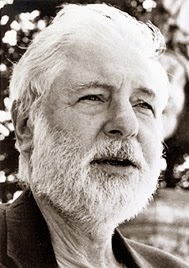
Interview with Ronald Sukenick
by Alexander Laurence
Ronald Sukenick is the author of numerous works of innovative fiction including Up, Out, 98.6, The Endless Short Story, Blown Away, and Long Talking Bad Condition Blues. His book of non-fiction, Down and In, recreated the New York underground scene from the fifties to the present. His most recent book of fiction, Doggy Bag (Black Ice Books), has been given an enormous welcome through many reviews in newspapers and large audiences on two recent reading tours of the United States. In a recent panel discussion in San Francisco at The Press Club on “Fiction into the 21st Century” Marjorie Perloff mentioned Sukenick as one of the most interesting writers now working.
Alexander Laurence: The last time we talked, you ended by saying how sexuality is an unstoppable force. Could you elaborate on this idea?
Ronald Sukenick: It’s such a basic appetite. It’s like hunger. Somehow or other, it’s going to manifest itself. If it’s not being manifest by its presence, it’s manifest by its absence. It’s like oxygen: you can’t do without it. You miss it if it’s not there. If you become numb to it, I guess you could do without it.
AL: You have written many novels that are both semi-autobiographical and which deal with sexuality. Are these just your fictional fantasies or are these experiencential?
RS: This could be an embarrassing and incriminating question. Let me just say that me writing is often a combination of experience and embroidery, but from the time I was working on Up, I decided that as far as writing goes, there was a continuum between what seems to be actual experience and what’s completely fantastic or fantasy-like. Because it’s writing, it doesn’t make any difference to the reader. That’s not the point, despite the eternal talk-show question of “Whether this really happened?” The reader doesn’t know and can’t know because it’s not actual lived experience, it’s writing experience. It’s a different kind of thing. So it makes it easy and even advisable to extend the possibilities of one’s actual autobiography into imagined autobiography. I think the tradition that you can trace this back to is Laurence Sterne, but certainly Henry Miller. I used to know Anaïs Nin, so I know that Miller’s autobiographical adventures are highly invented. It’s a form that I call “Pseudo-Autobiography” which is a form that I write in. The form is autobiography but it’s also fiction.
AL: Why is Henry Miller such an important writer?
RS: I think that Henry Miller is misunderstood, because I don’t think that the sexual content is the real core or the most important thing. It’s the most obvious thing, and at the time of his writing it, the most spectacular. That side is now out of favor because of the feminist movement. It’s true that looked at from today’s perspective, Miller is a sexist pig, but from the framework of the 1930s, he was simply a man of his time with the masculine ideals of that era, and willing to be frank about it. When it came to be the 1960s, when one read Miller, there was the recognition that he was crude about sex, but at least he wrote about it. It was a big revelation for us because that sort of activity seemed impossible because of censorship. The most important thing about Miller is his sense of what America is like, what an American is. He gets the sense of how Americans always feel that they can change their lives. They can always go through some kind of process of salvation which is secular but quasi-religious. That you can drop out of your job and go to Europe and find yourself, or find culture, or find enlightenment. You can completely revolutionized yourself and expand yourself, and rise to new levels of consciousness and a better kind of life. I think this is something that is very American; and not too plausible from the European point-of-view. Celiné writes in vernacular like Miller about similar lower middle class life, but there is no sense of hope. For fiction writers, Miller is like Whitman is for American poets.
AL: How do you feel about the idea about your writing functioning as a personals ad or a love letter?
RS: Actually, if you want to know the truth, it apparently acts like a love letter. There have been many occasions where women have approached me: it happened not long ago where a woman came up to me and said “Someone who writes that kind of explosive, sexual scenes that you write must be blah blah....” I remember another woman seducing me during an interview while talking about this very same subject. So apparently it has a very eroticized effect on some women. No doubt it makes other women furious. It’s beyond my control, in the sense that if I try to start censoring myself, I’m finished. I consider the beginning of my writing career to be a certain moment when I was working on my first novel, Up. I was writing a sexual scene, and I was typing away, and suddenly I wrote something sexual in the extreme, and I said to myself: “You can’t write that.” Then I went back and changed it. A minute later, I caught it. I said “What do you mean you can’t write that ? Why can’t you write that?” I realized that there was a voice in my head that was really censoring the raw material of my basic feelings.
AL: Part of Doggy Bag is about your experiences living in Europe for so long, where you have been many times since 1958. It used to be that Americans would go there to have a cultural experience, now it’s mostly escapism.
RS: My wife and I bought an apartment in Paris ten years ago since we were there practically every summer. We had a chance to buy this place and to fix it up. It’s a nice neighborhood. Doggy Bag is like a reversal of the exile generation, Hemmingway and Fitzgerald, of the 1920s. It’s inside out because they were going to Europe to discover enlightenment. It was my attitude that Europe doesn’t have enlightenment to offer anymore, not since W.W.II. I live in Europe because life is pleasant there, more pleasant in terms of simply indulging the appetites, visual as well as sexual; and of course the gourmet and food. When I first went there, the greatest compliment by a French person was “You don’t seem American.” Now they love America much to the distress of the culture guardians. They admire the technology and American Pop Art and music. One of the things that is going on there is that the American multi-national conglomerates are taking over the European popular culture, especially the films. In Paris, it’s hard to see a French movie.
AL: As far as the novel goes, what do you think about new forms having an influence on consciousness? I’m mostly thinking about writing that is radical and new: works that have a difficult time being marketed?
RS: The thing about liberated form is that you can’t package it and sell it so easily. If you’re going to, it’s much more convenient if it’s standardized. If something comes along that looks too weird, there’s a problem. It can be done, as in the case of Mark Leyner, but it’s harder to package something that isn’t easily recognizable. Leyner got by because he has become sort of a comedian, so there’s a certain latitude there: everyone understands comedy and laughter. If it’s too weird, it will not sell. It interrupts the whole economic chain. That’s the other threat to the status quo, for innovative style or liberated form. My opinion is that the best kind of art or writing is innovative in some sense. The rest of writing is merely literature: that means it’s yesterday’s great work repeated today in formula.
AL: Your novel 98.6 has been reprinted after twenty years. I found that it was most of all about a theme concerning pangrams and simultaneously dealing with language being like a DNA code.
I was trying to figure out some key language which is not normal language, but a secret code which bridges the gap between mind and body, spirit and material. I finally concluded that the secret language I was after is the genetic code. There’s now an actual dictionary of the genetic code. There’s a matrix language which they are rediscovering with linguistics. They are trying to crack this genetic code through linguistics. This code is both symbolic and concrete. That’s what all my manipulation of language has to do with in 98.6. The language play is not gratuitous.
AL: I know a little about Esperanto and that scientists have been trying to get back to “the mother tongue” through language analysis.
RS: Esperanto is an interesting phenomena, and so is the legend of Babel. The place you go to for ideas about language being real and a bridge between the real and the concrete and the spiritual is the Cabalistic tradition. Esperanto, which was an attempt to universalize language, was invented by a Jew in the 19th century. He was acting out of a Cabalistic tradition. I traced this finally to myself and my own work, because my last book written, Mosaic man, is about being Jewish. It is very lengthy and unconventional. There, I go into the Jewish relationship to language in the most direct way I ever have before. It is an attempt to find the language of languages, the matrix.
April 1995
Published on June 01, 2014 13:11
Siri Hustvedt Interview
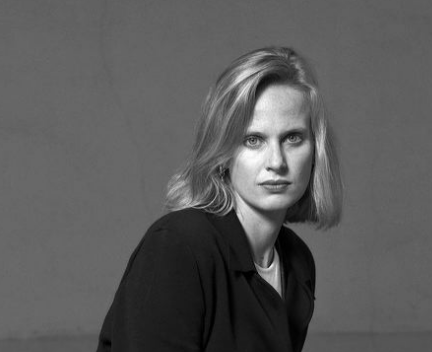
SIRI HUSTVEDT INTERVIEWby Alexander Laurence
Siri Hustvedt is the author of two novels including The Blindfold and The Enchantment of Lily Dahl. She lives in Brooklyn with her husband, author Paul Auster.
Alexander Laurence: Your new novel, The Enchantment of Lily Dahl, takes places in Minnesota, where you grew up. Could you talk about Minnesota?
Siri Hustvedt: It's Iris Vegan's hometown. Where Lily Dahl lives, is also where Iris grew up. I think that I always wanted to write about that place, where I grew up. I spent many years there. I even went to college in that town. Webster is not a real place. It's based in Northfield, Minnesota; and that's where the Jesse James bank robbery took place, and the citizens of Northfield rose up and stopped the James' Gang. It was all out of my life. That place was deeply formative and important to me. For me, writing books has always been about something that has settled in me for a long time. The Blindfold was about an early period in my life in New York. It's not autobiographical, but I certainly used things from my life about ten years previous.
AL: I found The Blindfold more fragmented than the new book. It was told in sections that were out of order.
SH: It has a fragmented narrative and it's in the first person. I wanted to write what is, for me, a fairly traditional narrative, with a beginning, a middle, and end. I wanted to write a third person novel just because I wanted to do something else.
AL: Since you have many references to photography and paintings in your writing, I was wondering if you had some sort of art background?
SH: It's interesting, not really, except on my own. As an undergraduate I studied history, then at Columbia I got a Ph.D.. in literature. I love art and painting, so I made it my personal business to have a private catalogue of important paintings that I really care about. The new novel is partly about the fact that Lily emerges from childhood. But that's not the main story. Perhaps more in this book, I was interested in the relationship between art and the world.
AL: What about the relationship between Mabel and Lily? Mabel seems to me to be this Falstaff-type character. Definitely a guiding spirit.
SH: Right. She's also like a fairy godmother. I personally feel closer to Mabel than to Lily. Mabel's more like me than Lily is. I love Mabel: she's a wonderful kind of strange and nervous character. That's the great love story in the book, between those two women.
AL: How do you feel about fiction that parades as pseudo-autobiography?
SH: Let me put it this way: the germ of every novel, even those novels that are purely fantastical, those novels about flying people or whatever, they nevertheless have some seed in experience of the writer. I think that experience is part of the imagination, but for me, it's just a beginning. I am not interested in doing straight autobiography.
AL: A character takes pictures on balconies in The Blindfold and then says "You like the danger." I feel a constant sense of danger in your books, like there always something around the corner.
SH: (Laughter) I think that I'm interested in danger so to speak. I am interested in it psychologically. That this feeling of danger is a threat. I realized that I loved books while growing up that had some kind of suspense, some kind of engine that pushes the narrative along. Suspense is always about not knowing. It's just about not knowing and I think that's really my subject: what you don't know. And how not knowing things is often kind of scary. I guess that my idea is not to really shut that down, but to let it go on. In other words, even after the so-called mystery in mystery (that's not exactly a mystery) is solved, Lily thinks to herself at the end that the secret wasn't the doll, the secret is elsewhere. It's always elsewhere. The secrets go on and the mysteries between human being are always present. Does that make sense? The impulse for me to write is to write about stuff that I don't understand.
AL: There's several references to films in this book, and Lily is obsessed with Marilyn Monroe. Why do you refer to films?
SH: I referred to Murnau's Sunrise in The Blindfold because I loved that movie. I love the end of Bus Stop, and I love Some Like It Hot, which I think is a perfect movie. It's one of the great movies ever. I really think that. I'm not kidding. I would put it up there with The Grand Illusion. In the new book, I have these icons: there's Elvis and there's Marilyn, and then there's Jesse James. So you have the mom and dad cultural icons hovering over The Ideal Cafe. Both Elvis and Marilyn have had a lasting cultural impact that I find fascinating. They resonate in the culture.
AL: Is the process of self-revelation also involved with a discovery of the outside world? Your characters seemed to be deeply involved with their most immediate surroundings, their situation, but not with abstractions or political views?
SH: I think that is true to an extent, except that those immediate issues at hand, for me anyway, resonate with the larger moral and political questions in the world. In other words, ultimate questions are metaphysical and moral. For me the stakes are not low because we are not discussing politics, or because my characters aren't out there to save the world. In The Blindfold, I think murmuring beneath the whole text is the Holocaust. I always felt that. This whole idea of evil. There are several references to the Holocaust in that book that are oblique. For me, these are the big things, those are the big issues. For Lily trying to penetrating the mystery of Martin: it is a kind of ultimate question. And what is really real? It's like in Midsummer Night's Dream, which is all about appearances and reality, where Puck says at the end: "Don't worry about it, if you find this too much to take, you can just tell yourself that you dreamed it."
AL: What about some of the characters names? Iris Vegan lies about hers. Lily Dahl is an unusual name. Issues of identity seem to play a large part here?
SH: Lily has a more coherent identity than Iris. Iris is sort of an intellectual out there experimenting. Lily is rather young and still forming herself. I personally don't believe in identity as a fixed thing. You know how people say how they are finding their real selves? I don't believe it. I think that identity is a narrative that is formed over time. I think that cultural fictions play a big role in identity.
AL: The stories we tell ourselves?
SH: Exactly. The stories we tell ourselves. I don't mean that as other books or literature, I just mean how we tell ourselves what we are. How the heck do we know that we are right? You know what I mean. I mean on the most basic level. Nothing fancy. We are formed through others.
AL: What sort of spiritual interests do you have? Is transcendence very important to your characters?
SH: Lutheran. It has been very important to me. As far as my characters go, they are interested in some kind of transcendence beyond their lonely selves, absolutely. It probably has to do with other people and a sense of community. Iris feels so alone because she doesn't have that. Lily does in a way have it in that funny town.
AL: There much reference to the art world, theater, classical music, but not much to popular culture, such as kitsch and TV. Why is that?
SH: It's probably because I'm not such a pop culture kind of girl. Besides the few pop icons that I mentioned it's true that television is not deeply a part of my life. My husband uses a manual typewriter, but I use a computer, so there is a generation gap. Most things in popular culture don't interest me in themselves. Sometimes they interest me as phenomenon, as something which says something about the culture. I am fascinated by what it means that people will go on talk shows and confess their crimes on television. I find that revealing.
AL: What about literary influences or so-called literary enablers? What book did you read that made you think about becoming a writer?
SH: I can tell you that when I was thirteen I read David Copperfield and Jane Eyre. Those two books changed my life. Later, I read Crime and Punishment, which was a huge book for me. And also Henry James' Turn of The Screw. And James in general. I realize how terribly important James is to me. Not because I write anything like James, but because I think the subtlety of those interactions between people in James, I just can't get enough of it. I have been reading more James just lately. I read the Awkward Age and What Maisie Knew: two books I have never read before.
AL: When I see the title, The Enchantment of Lily Dahl, I immediately think of The Ravishment of Lol Stein. Is that intentional? Is there any awareness of Marguerite Duras?
SH: I read that book by Duras, but I didn't think of that. Someone else mentioned the Duras book. I admire Duras. She's very different. Duras is interested in many things that I'm interested in. After thinking about this question I realize that I admire Duras but I have a certain reservation about some of the work too. I think that the reservation comes from two different traditions: that very cool French tradition, of a certain kind of removal in French fiction that goes throughout, it's very interesting; and an English tradition that is much more engaged. I think that I belong more firmly in the English side of things, even though what Duras is interested in is not unrelated to what I'm interested in: those sort of haunting, ambiguous, relations among people, and a certain kind of perversity even in rather normal people.
AL: Since writing has been over-powered by popular media, what do you think the role of writer has become?
SH: It's a good question. I think that it's something that writers think about quite a lot. In Europe there's more respect for writers, even if they don't sell a million copies. I think that it's true that writing literary books is a marginal activity. Except in some funny ways, it has always been that way. You have to remember that when Thoreau and Hawthorne were writing, there were women novelists in America selling half-a-million copies of their books. We don't read those women anymore, and maybe a lot of people are not reading Thoreau and Hawthorne anymore either. But there's a lasting effect on the culture of those wonderful writers who sold very few books. You don't choose to be a writer because you have this idea that you want to make a huge cultural impact. You become a writer because that is what you feel you have to do, and you feel better doing that than anything else, and I feel very lucky that I can do it. You know what I mean? That I don't have to work at the grocery store and write my books on the side.
AL: Any other writers that you like?
SH: Now? Insatiability by Wicowitz. It's an amazing book. Of course it's an old book. I admire Don DeLillo very much, who I know. I think that he writes beautifully, and I think that he's always one step ahead of the culture. I think that is an amazing thing to be. I admire all sorts of writers. I like Waiting For The Barbarians by Koetzee. It's a masterpiece.
AL: Your working on a book of essays now?
SH: I discovered that I really like writing essays. That really is that other brain that I left in graduate school, even though they're not academic essay in that way. I wrote an essay about a painting by Vermeer that was actually published in an art magazine in England. Woman with a pearl necklace. I realized that it was an annunciation painting. That's what I wrote about. I wrote a long essay about place and memory called "Yonder" and one about Dickens about language and identity. All my obsessions are in there. I'm thinking about writing a plea for Eros. I want to make some sort of plea against the culture of explanation. I think that understanding how ambiguous and inexplicable a lot of things are in the world is not a bad thing for us. Not to take things for granted, not to make every answer so easy. That's my plea. I think that erotic experience is an ambiguous experience. Throughout history there always been these erotic cultures where they have practiced it as an art, and I don't think that there is anything wrong with that. Sexuality now has become sort of grim. Everyone is defending themselves. Everybody has a fixed sexual identity. It's depressing. I don't look at American culture as a culture that celebrates Eros, do you? Everyone is so serious about it all. I guess that there is a Victorian legacy. Desire is the nature of being human. If you are totally satisfied you can't live.
September 1996
Published on June 01, 2014 13:08










